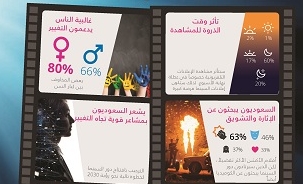
KSA Cinema Re-Opening Brings Positive Sentiment, 67% Intend to Visit Theaters
Saudi Arabia’s recent announcement to lift the 3-decade old ban on commercial cinemas is expected to bring further growth prospects in their economic landscape. Latest study by Kantar TNS conducted among Saudi residents reveal fresh opportunities for marketers to make inroads into the kingdom, with an impact beyond the immediately affected sectors.
Kantar TNS – one of the largest global research agencies– carried the research leveraging their online mobile citizen panel Kantar MobiworkX to understand how citizens feel about the change, and what impact this might have on consumer behavior.
As per the study, the announcement was met with largely positive sentiments, with 80 percent of the residents supporting the change, while 67 percent intending to visit the cinemas. The step was particularly hailed by the youth and many felt a strong emotive connect with the change, in line with the Vision 2030 Progressive society. The development of the entertainment sector will also create much needed new employment opportunities within the Kingdom, and as multiple entertainment options emerge, travel to UAE and Bahrain is likely to reduce.
Stephen Hillebrand, CEO Kantar Insights, MENAP said “There are few markets in the world at the moment as dynamic and fast moving as KSA. The speed of change is unprecedented, and the compound effect of the changes makes for a fascinating time in assessing the impact on both citizen beliefs and consumer behaviours”.
For marketers, the step will provide a new platform in cinema advertising, giving further exposure to their brands at a mass scale. Television advertising, however, may be negatively impacted, particularly during weekends. Malls, too, will find new utility value, and those without cinemas will see a decline in footfall. As per the research, 90 percent of Saudi residents plan to visit malls with cinemas more often, giving further boost to mall retailers. However, Mall operators need to bear in mind that travel time matters, and the majority of movie-intenders expect to travel no more than 30 minutes. They will also need to work hard to fill matinee slots, with demand heavily oriented towards the 7-10 pm slot.
“Due to the significance of this change, we anticipate a huge turnout in initial days and weeks. In an extremely connected society, supporters of the change want to be part of the historic re-opening, and more than half of those wishing to go the movies plan to do so in the opening week. We expect social media to be awash with movie-going pictures, mall operators need to carefully plan ticketing strategies to ensure that the images of opening nights are the right ones, added Hillebrand.
“Brands have an opportunity to associate themselves with the changes, and those able to play a meaningful role in customer journeys stand to benefit”, Hillebrand further commented.
However, along with the opportunities, there are risks for brands who wish to tap into the high levels of emotions surrounding the change. Brands should be careful not to overlook some negative sentiments (18% being concerned by the changes) and any attempt to associate with the change needs to be done carefully. Clumsy efforts by brands to ‘own the change’ have backfired elsewhere, notably in the US.
Finally, the Ministry of Culture and Tourism will have a delicate balance to strike. With movie-intenders expressing a significant interest in viewing foreign films as well as the action and adventure genre, getting content and censorship right will be key to growth of the sector.
Despite the dominant influences of foreign content, Saudi media and creativity has an opportunity to grow, and 36% of movie-intenders already plan to view local Saudi content with the figure rising to 48% for Arabic content.



























